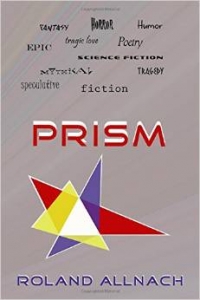Title: Prism
Author: Roland Allnach
Publisher: All Things that Matter Press
ISBN-13: 978-099604134-8
Pages: 270, Paperback
Genre: Science Fiction, Tragedy, Fantasy
Reviewed by: Jason Lolus, Pacific Book Review
Book Review
Quite an intriguing and thought-provoking storyteller. Each piece in this collection is literally and figuratively engaging. In short, Allnach’s abilities as a storyteller in transporting the reader to fantastic worlds is obvious, but these tales also lend themselves to allegorical comparison with current issues, private to sociological. The wide cast of characters in this collection range from the pathetic to the triumphant to the homicidal and psychotic. The collection could have aptly been called “Tragedy and Comedy” but that would have been too cliché. There is plenty of tragedy, some comedy, numerous elements of the surreal and always with hints of suspense. He keeps you guessing. In this collection, you will find short stories reminiscent of Poe’s style of the grotesque, troubled mind. You will also find epic poetry, Shakespearean tragedy, and occasionally some comic relief. There is something for everyone, but the roads in most of these stories dark and paradoxically laden with hope and hopelessness.The final story, “Dissociated” is on the cyclic nature of things, writing, and life. A nice way to close, considering the first story, “After the Empire,” is about the end of things. Although there is a wide range of issues and genres in Prism, there is the sense of a continuum, much like a concept album where the songs exist on their own but somehow synthesize together. The soldier in “After the Empire” willingly fights for a lost cause. The protagonist in “11” fights against his own subconscious. The critic in “Icon” fights against the media’s sycophantic infatuation with celebrity; and thereby fights against himself. So, there is this continuum of struggle, reflection, rebuilding, reconciliation. In “Memento,” Henry tries to reconcile by reaching out to his enemy’s family. Internal psychological struggle and actual war parallel each other like the two faces of a prism, with multiple angles of introspection and allegorical interpretation on the sides. Dark as they are, they invite the reader to look at struggle as difficulty but also as an accepted challenge, and there is optimism in that pessimism. It’s not all Sisyphean. Allnach provides levity with the nose-picker in “The Great Hunter” and the poem “Tumbleweed” otherwise titled “An Ode to a Well Endowed Gunslinger.”
I have to mention “Beheld” as a really interesting look on creation itself. But where Allnach really goes out on a limb is with “Titalis” and “Typhon and Aerina.” Titalis is a tragedy with Shakespearean themes and the flowery language to boot. “Typhon and Aerina” is an epic poem written in classical style. This makes an interesting juxtaposition in the collection; so much science fiction is set in the future, but these are ambiguous as they could be in the distant past, the distant future, or in some parallel universe. This calls to mind the Family Guy mockery of Star Wars noting the tale is “in a galaxy far, far away but somehow in the future.” Kidding aside, this is the mark of a good science fiction writer; to give tales some linear ambiguity, leaving it up to the reader to decide if they’ve already happened or have yet to be.



Follow Us